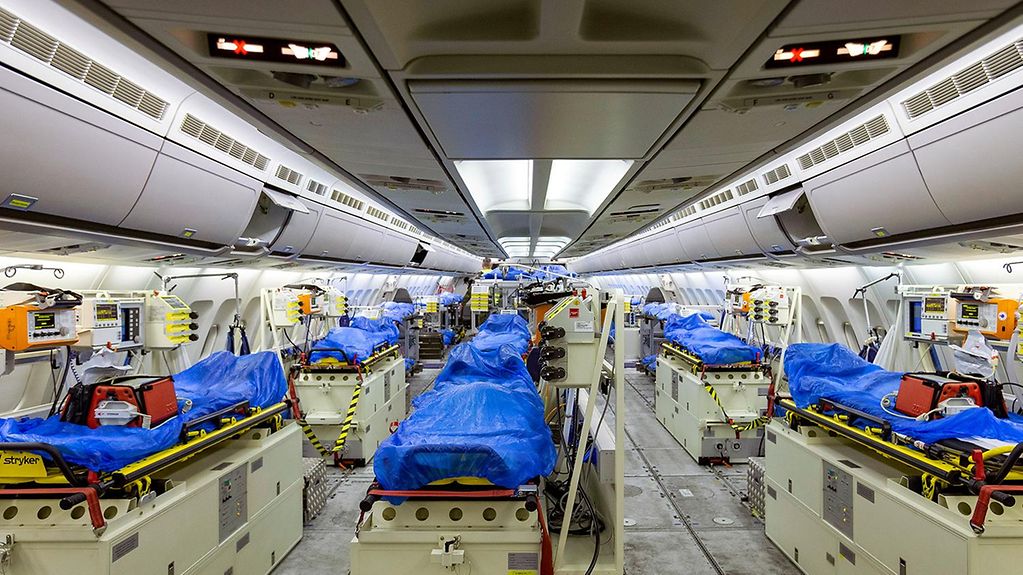International donor conference for Lebanon
The German government has pledged another 20 million euros to alleviate the acute suffering in Lebanon, announced Federal Minister for Foreign Affairs Heiko Maas after an international donor conference. In the wake of the devastating explosions in the port area of Lebanon’s capital, Beirut, on Sunday, France hosted the conference.
3 min reading time
"The people in Beirut need our help and they need grounds for hope," declared Federal Minister for Foreign Affairs Heiko Maas. That is why he is happy that Germany is able to provide an additional 20 million euros from humanitarian assistance and development cooperation funds.
This sum will supplement the 1.5 million euros that the German government made available immediately after the Beirut explosion for emergency aid.
Numerous states pledge assistance
At the pledging conference for Lebanon a total of 252.7 million euros was raised. Numerous states and organisations attended the video conference, hosted by French President Emmanuel Macron and the United Nations.
Even before the conference in Paris, Heiko Maas noted, "As friends and partners, we must help lay the foundations for a strong state that gives its citizens democratic rights, liberties and the opportunity to participate. Und for a social order that takes account of the wishes and the demands of the people."
THW and Bundeswehr deployed
Following the disastrous explosions in the port of the Lebanese capital Beirut on Tuesday 4 August, the German government dispatched relief specialists from the Federal Agency for Technical Relief (THW) and Bundeswehr troops to the Lebanese capital to help relief efforts. On Wednesday, 50 specialists and tracker dogs from the Federal Agency for Technical Relief (THW) arrived in Beirut. They are part of the rapid deployment unit for overseas rescue (SEEBA) and the Embassy support team. The forces are there primarily to investigate and assess the situation on the ground, localise and rescue people trapped under rubble, and support the Embassy.
Bundeswehr flying intensive care unit and mobile medical unit ready to deploy
On Thursday morning a Bundeswehr medical assessment team was flown out to Beirut in a German air force aircraft. The team will be working with the Lebanese authorities to ascertain what assistance is needed and can be supplied by the Bundeswehr on request.
The Bundeswehr’s ‘flying intensive care unit’ (StratAirMedEvac – strategic patient transport) is also ready to deploy from Köln-Wahn airport. It can transport up to 44 patients lying down, and has space for up to six patients in need of intensive care. The MedEvac was originally intended to fly injured soldiers out of crisis-affected regions for medical care. Meanwhile a mobile medical unit is on call at Leer in North-West Germany. It can be deployed within 96 hours if needed. The mobile medical unit with ten beds provides initial medical care for patients.

The StratAirMedEvac (strategic patient transport) can transport up to 44 patients lying down, and can carry up to six patients in need of intensive care.
Photo: Bundeswehr/Kevin Schrief
Support through the EU’s Civil Protection Mechanism
Janez Lenarčič, the EU’s Commissioner for Crisis Management, has informed member states that the EU’s Civil Protection Mechanism has been activated in response to a request by the Lebanese authorities. The mechanism coordinates the relief supplies and services of member states offering support in a crisis. In addition, the European satellite Copernicus is being used to establish the scale of damage.
On 4 August massive explosions shook the Lebanese capital Beirut, causing widespread damage across the city. The energy released by the explosion was equivalent to an earthquake measuring 4.5 and was felt more than 250 km away in Cyprus. The death toll now stands at over 100, with some 5,000 people injured. This number includes a member of staff from the German Embassy. The Chancellor has sent her condolences to the Lebanese Prime Minister and pledged the assistance and support of the German government.
The devastating explosion in Beirut’s port area is a huge challenge for Lebanon, not least in terms of addressing the immediate humanitarian crisis. The country was already in a precarious state before the disaster. It is facing a serious economic crisis and has been hard hit by the COVID-19 pandemic.